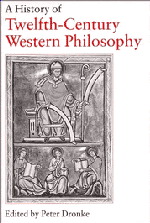Book contents
- Frontmatter
- Contents
- Preface
- Contributors
- List of abbreviations
- Introduction
- I Background
- II New Perspectives
- 5 Scientific speculations
- 6 Speculative grammar
- 7 Logic (i): from the late eleventh century to the time of Abelard
- 8 Logic (ii): the later twelfth century
- III Innovators
- IV The Entry of the ‘New’ Aristotle
- Bio-bibliographies
- General Bibliography
- Index of Manuscripts
- General Index
6 - Speculative grammar
Published online by Cambridge University Press: 01 June 2011
- Frontmatter
- Contents
- Preface
- Contributors
- List of abbreviations
- Introduction
- I Background
- II New Perspectives
- 5 Scientific speculations
- 6 Speculative grammar
- 7 Logic (i): from the late eleventh century to the time of Abelard
- 8 Logic (ii): the later twelfth century
- III Innovators
- IV The Entry of the ‘New’ Aristotle
- Bio-bibliographies
- General Bibliography
- Index of Manuscripts
- General Index
Summary
The title of this chapter, ‘speculative grammar’, might need elucidation on two points. Firstly, from a historical point of view, the Latin equivalent of ‘speculative grammar’, grammatica speculativa, was used exclusively by and for modistic grammar of the late thirteenth and fourteenth centuries. Grammarians of the twelfth century speak instead of a grammar for the more mature students, the provecti. Secondly, ‘speculative’ grammar is here chosen because it implies a focus on a purely theoretical framework of linguistic description, disregarding the concomitant practical training and pedagogical short-cuts as well as literary analysis of the Latin language and Latin literature. Sometimes, the German term Sprachlogik or, better, Sprachtheorie has been used to designate this theoretical approach, which grew more vigorous in the following centuries. For the twelfth century, the speculative parts of Latin grammatical description occasionally encroach upon logic, but generally they are concerned with questions such as universal grammar and definitions of a word or a part of speech, and with the question of meaning versus reference (to extralinguistic or extramental entities).
The sources
One of the main difficulties in the study of speculative grammar of the twelfth century is the state of the sources – most of the material is still unedited or only partially edited. Since grammatical manuscripts are particularly prone to extraneous additions (interpolations) and to rearrangements of material, even very early in the tradition of a certain text, we cannot always be confident that we have what the author actually meant to say.
- Type
- Chapter
- Information
- A History of Twelfth-Century Western Philosophy , pp. 177 - 195Publisher: Cambridge University PressPrint publication year: 1988
- 94
- Cited by



